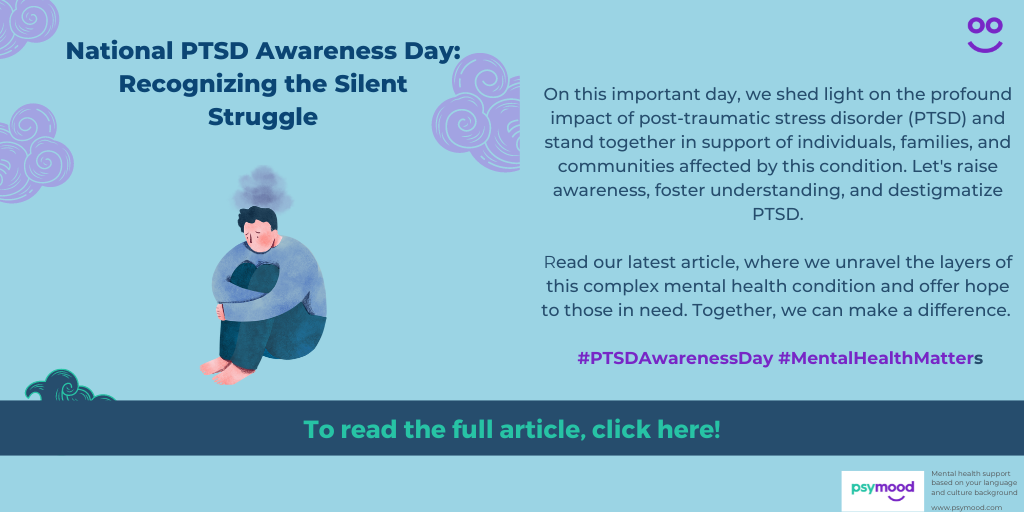National PTSD Awareness Day: Recognizing the Silent Struggle
Every year on June 27, National PTSD Awareness Day is observed to shed light on the profound impact of post-traumatic stress disorder (PTSD) on individuals, families, and communities. This significant day serves as an opportunity to raise awareness, foster understanding, and promote support for those affected by PTSD. By unravelling the layers of this complex mental health condition, we can work towards destigmatizing it and offering hope to those in need.
Understanding PTSD
Post-traumatic stress disorder (PTSD) is a mental health condition that can develop after experiencing or witnessing a traumatic event. It can affect individuals from all walks of life, including military personnel, first responders, survivors of accidents or natural disasters, victims of abuse or violence, and anyone who has endured a distressing event. PTSD can manifest differently from person to person and may appear shortly after the event or even years later.
Symptoms of PTSD
The symptoms of PTSD can be categorized into four main clusters:
- Intrusive Memories: These can include recurrent distressing memories, nightmares, flashbacks, or intense emotional reactions triggered by reminders of the traumatic event.
- Avoidance: Individuals with PTSD may avoid places, people, activities, or conversations that remind them of the traumatic event. They may also try to numb their emotions or detach themselves emotionally.
- Negative Changes in Thinking and Mood: This cluster encompasses negative thoughts, feelings of guilt or blame, diminished interest in activities, social withdrawal, difficulty experiencing positive emotions, and memory problems.
- Hyperarousal and Reactivity: People with PTSD may exhibit hypervigilance, exaggerated startle responses, difficulty concentrating, irritability, insomnia, and reckless or self-destructive behaviour.
Causes of PTSD:
While PTSD is commonly associated with traumatic events like combat, it can also arise from a variety of distressing experiences. Some common causes include:
- Combat exposure
- Physical or sexual assault
- Accidents and natural disasters
- Childhood abuse or neglect
- Witnessing violence or death
- Serious accidents or life-threatening medical conditions
Supporting a Friend with PTSD
Finally, supporting a friend with PTSD (Post-Traumatic Stress Disorder) requires patience, understanding, and empathy. Here are some tips to help you provide support:
Educate yourself: Learn about PTSD, its symptoms, and common triggers. This will help you understand your friend’s experiences better and provide appropriate support.
Be a good listener: Encourage your friend to share their feelings and experiences. Listen attentively without judgment or interruption. Let them express themselves at their own pace, and validate their emotions.
Offer reassurance: Remind your friend that they are safe and that you are there for them. Reassure them that they are not alone and that their feelings are valid.
Respect boundaries: PTSD can make individuals feel overwhelmed or triggered by certain situations. Respect their need for space and privacy. Let them know that it’s okay to take breaks or decline invitations if they are not ready or comfortable.
Avoid triggering situations: If you know of specific triggers, do your best to avoid them. Be mindful of topics, images, or activities that may cause distress. Create a safe and supportive environment for your friend.
Encourage professional help: Suggest that your friend seek professional support from a therapist or counsellor who specializes in trauma. Offer to help them find resources or accompany them to appointments if they’re comfortable.
Provide practical assistance: Offer practical support by helping with daily tasks or responsibilities when needed. This can alleviate some stress and allow your friend to focus on their healing.
Practice patience: Recovery from PTSD takes time, and everyone’s journey is different. Be patient with your friend’s progress and setbacks. Avoid pressuring them or rushing their healing process.
Be mindful of self-care: Supporting someone with PTSD can be emotionally demanding. Take care of yourself by seeking your support, setting boundaries, and practicing self-care. You need to be in a good mental and emotional state to provide effective support.
Offer additional resources: Share information about support groups, online communities, or relevant books that may help your friend. Knowing they are not alone can be empowering for someone with PTSD.
To conclude, National PTSD Awareness Day serves as a reminder that we must extend compassion and support to those affected. Remember, supporting someone with PTSD can be challenging, but your presence and understanding can make a significant difference in their recovery.
Do you experience PTSD and are looking for the right mental health specialist for you? PsyMood can help you find a specialist who speaks your language and shares your cultural background. Click here to find the best specialist for you!
PsyMood is a digital tool designed to help you find the support you need in the language that you are most comfortable with. PsyMood considers cultural background, geographical location, interests, and personal needs, amongst other factors, to pair you with service providers for either online or in-person therapy sessions.
For More Interesting Posts
You may also be interested in learning more about Remembrance Day: Addressing PTSD in Soldiers, Navigating Anxiety and PTSD: Newcomers Escaping Conflict and the Impact of Local News at their New Home, and Specialists who work with individuals with stress disorders (PTSD).


.png)
.png)
.png)
Recent Comments